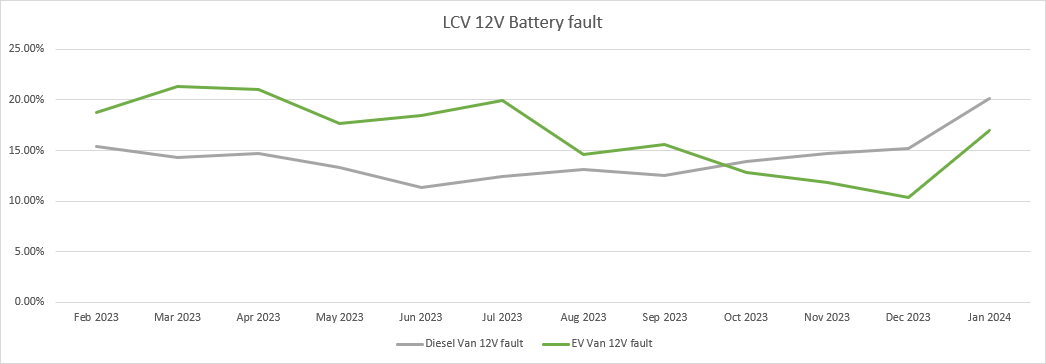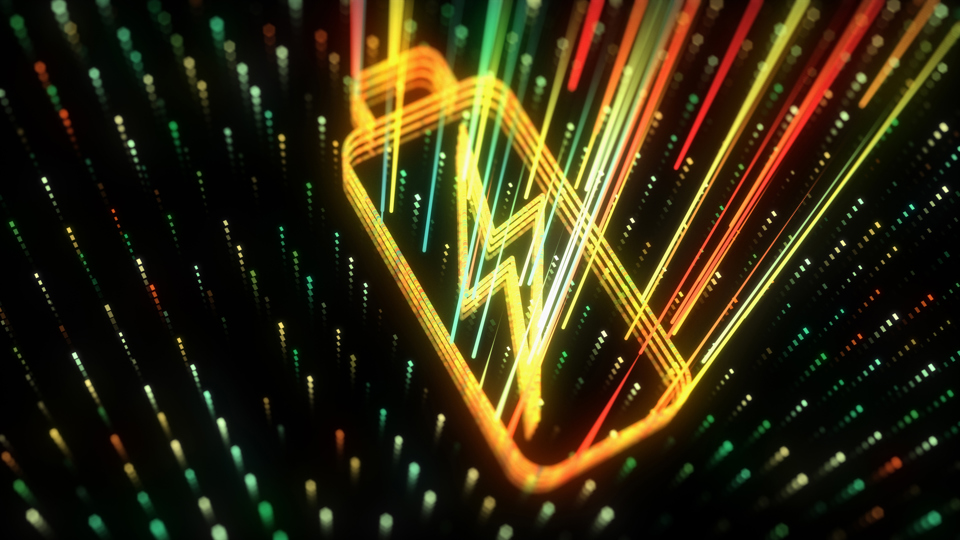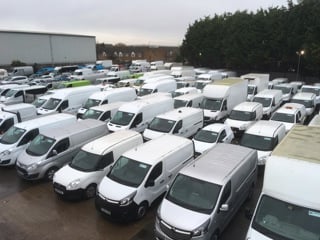Fleet managers are being warned that the 12-volt battery on their electric vans may unexpectedly go flat, leaving them unable to start the vehicle and having to pay hundreds of pounds for a breakdown call-out and, potentially, a replacement battery.
The Association of Fleet Professionals (AFP) says that fleets are reporting they have experienced battery drain across a number of key electric vans. In some cases, the battery died even when tethered to a charge point.
Paul Hollick, AFP chair, told Fleet News at 10: “This is definitely a significant issue on e-LCVs (electric light commercial vehicles), especially those that when charging, the (12v) battery is not being topped up.
“It is not an isolated fleet and seems to be an issue for all e-LCV fleet deployments.”
Lorna McAtear, head of fleet at National Grid, explained that, when driving, the 12v battery charges, so it should not be a problem.
However, for fleets who frequently stop or if a driver goes on holiday for two weeks and the vehicle is parked up, she says it is.
McAtear noted the issue is not unique to electric vehicles (EVs), with fleets deploying additional batteries on diesel vans in the past, but she said: “We’re seeing it more on EVs” and “it’s happening much quicker than we all expected.”
She added: “Fleets are early adopters, and everybody is still learning, but it’s frustrating that some manufacturers aren’t listening to our feedback and instead they blame the kit we put on commercial vehicles such as telematics or LED lighting.
“But National Grid doesn’t have telematics in our vehicles, and we’ve still got the problem.”
Hollick suggests fleets should consider fitting a solar panel to the roof of the van to solve the issue. But at a cost of about £800 per van it would prove expensive for a major fleet.
“We’re already paying more for an EV and this is a cost we can’t necessarily afford to have,” said McAtear.
More issues with EV vans than ICE vans
Data from The AA shows that over the past year there have been more 12v battery faults on electric vans compared to diesel vans (see chart below).

Lee Houston, AA EV technical liaison engineer, said that this could be due to a number of reasons. EV batteries are typically smaller and lower capacity, as they are not required to output to a starter motor, they are just used to switch on the system and run 12v components.
They are usually connected vehicles so they may output data when at rest, meaning the 12v battery will be discharging. And DC-DC converters only charge when the vehicle is active, in ‘ready’ mode and, in the vast majority of cases, the 12v is not supported, even when the vehicle is charging.
The data also suggests that the EV 12v battery failure/discharge issue is improving. Houston said this could be due to continuous improvement from manufacturers, using over the air updates to adjust parameters within the vehicle, as well as driver education and actions improving.
What do van manufacturers say?
Fleet News understands that among the makes and models fleet managers have experienced issues with are the Vauxhall Vivaro Electric, Nissan e-NV200 and Maxus eDeliver 9.
A spokesperson for Vauxhall said: “We are not aware of any such issues on the Vivaro Electric. We have had a small number of cases with this issue where non-approved conversions have been carried out and our technical team have worked with the customers involved to overcome these issues.”
Nissan said that it was aware of a “small number of historical cases where a fault with the charge point led to the 12v battery being drained after charging was completed. In these cases, it was determined that there was not a fault with the vehicle”.
Maxus acknowledged the “frustration” of an “unexpected 12v battery discharge, particularly when vehicles are tethered to charge points”.
“This is an issue that Maxus became aware of some time ago and has addressed to ensure it does not affect customers going forward,” a spokesperson said.
Maxus discovered that specific makes of charge stations did not power down at the end of the charge and instead would periodically ‘ping’ the vehicle, activating the vehicle’s control units unnecessarily, therefore draining the 12v power.
To address this, Saic Maxus has rewritten software upgrades, which enable the vehicle's control units to intelligently ‘ignore’ unnecessary ‘pings’.
In relation to general 12v battery discharge, Maxus said its vehicles are equipped with telematics that routinely monitors and identifies potential defects, including issues related to battery discharge.
To date, it has not identified “any inherent vehicle defects leading to unexpected 12v battery discharge”.
However, it explained issues can arise when electrical devices that consume 12v power, such as lights or radios, are unintentionally left active, resulting in the battery flattening. This is similar to occurrences in traditional internal combustion engine (ICE) vehicles.
Hollick said the AFP will keep “a watching brief” with members on the issue.
Does the 12-volt battery unexpectedly drain on cars?
Data from The AA shows a greater percentage of 12v battery faults on ICE cars than electric cars (see chart below).

Some fleet managers say they have experienced issues with their company cars, although the number of incidents are small.
“We’ve suffered about 10 failures on the 12v battery on our Hyundai Kona Electric models in the past six months,” said a fleet manager who wished to remain anonymous.
“We’ve had it happen with different usage types, different geographies and different periods of time when the cars have been parked up.
“In some cases, the car started in the morning, the driver went to work and parked in the office car park and when it was time to go home the battery had discharged.”
Hyundai Motor UK told Fleet News that there were a “small number” of cases of premature 12v battery depletion on some 2019 and 2020 model year Kona Electric models.
A spokesperson added: “We have service actions in place to address this issue, which include a 12v battery health check with a replacement of the battery under warranty if required.”
Steve Openshaw, group fleet and transport manager at Eric Wright Group, whose fleet is 75% electric, has experienced the issue with a number of company cars when parked overnight.
Dealers investigated the issue with two Kia e-Niros and an MG4 and were not able to find a fault.
Highlighting the rareness of such incidents, a spokesperson for Kia said: “Almost all cases of battery drain that we've seen have been caused by third-party software and/or hardware, or user error.”
MG Motor UK added that it was aware of a “small number of reports from fleet customers regarding issues with 12v batteries in their models”.
A spokesperson explained: “After investigation it was determined that the instances brought to MG’s attention were due to driver error where, due to the car not being locked properly, the vehicle was not shutting down correctly causing a drain on the 12v battery.
“Another singular occurrence that MG has now resolved was regarding a fitted tracker device which linked to the 12-volt battery and remained constantly live, so when the car was parked for a period of time it was draining the battery.
“MG has worked with the customers in these instances to find the root cause of the issues and advise solutions. The team have also been communicating with future customers and ensuring they are aware of these potential issues.”
However, Openshaw is concerned about the impact on drivers. “People could lose confidence in the vehicle and worry that they’re going to get stranded somewhere,” he said.
It is also an issue for hybrid vehicles. The 12v battery on Toyota Auris models produced between December 2012 and February 2014, for example, was unexpectedly draining due to the hazard switch being partially depressed for a very short period of time. Toyota fixed this with a software update.
However, more recently, drivers have commented online about the 12v battery draining on other Toyota hybrid models.
Toyota’s advice online regarding their hybrid vehicles is: “Once the hybrid system is on (as indicated by the ‘ready’ light), the 12 volt battery will be charged by the high voltage battery, which in turn is powered by the engine.
“In some cases, infrequent usage and short journeys can mean that the 12v battery doesn’t fully charge. If you were to make more frequent, longer journeys, these shouldn’t be an issue.
“However, if you are leaving your vehicle unattended for long periods of time, a trickle charger or solar powered intelligent charger are advised, in order to maintain the battery’s charge.”
It also recommends that if any customer has battery or charging problems they should speak to their local Toyota retailer for further help.






















Login to comment
Comments
No comments have been made yet.